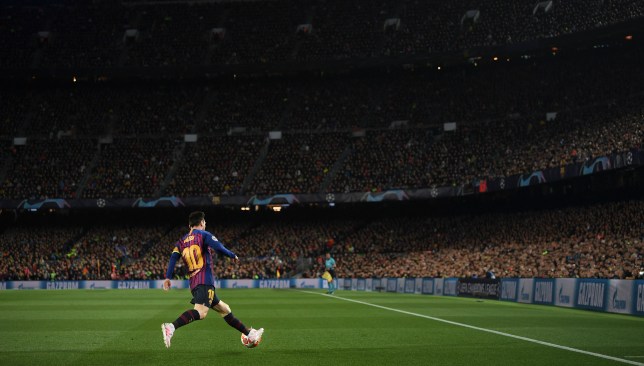
Irrespective of which team you support or the outcome, it’s fair to say that Barcelona and Manchester United locking horns is the kind of football match that pretty much any fan would want to see.
So, here’s an idea…maybe, just maybe, we could arrange it for them to play a bit more often?
Tuesday night’s meeting was the first time they had played at the Camp Nou since 2008, when a goalless draw was part of a two-legged United victory en route to the Champions League Final, which saw them defeat Chelsea in Moscow. If you need to be reminded how long ago that was, it was before Pep Guardiola took over as Barcelona manager, and a young defender called Gerard Pique was on the bench for United.
Since then there have, of course, been a couple of finals, both won by Barcelona in 2009 and 2011. But in terms of games at their own venues in front of passionate home crowds, this year’s meetings were the first for more than a decade.
That, if you stop to think about it, is just madness. And it is one of the reasons why a remodelled Champions League – call it a European Super League, if you like – could be (emphasis on ‘could’) far, far better than most fans seem to fear.
And yes, fear is the word. That simple phrase, European Super League, is guaranteed to strike anguish into hearts and provoke the ire of the majority of the continent’s fans, who appear to be terrified that evil and greedy moneymen are poised to steal the soul of their beautiful game.
To an extent, that concern is justified. If we all just rolled over and let the big clubs have what they want, some factions within that elite would be positively delighted to create a new closed league, with no promotion or relegation, and membership purely decided by economic might and marketing potential.
No real football fans want to see that.
However, that does not mean the current Champions League model is perfect and should be retained in its present state. There are far too many dead games, with the competition not really coming alive until the knockout stages in February, a full six months after the start of the European season.
In the group stages, most games are irrelevant because we know who is going through anyway, and even the occasional shocks end up counting for nothing other than one isolated night of joy for the underdog’s fans. Witness, for example, the respective victories gained this season over Liverpool and Real Madrid by Red Star Belgrade and CSKA Moscow, neither of whom qualified for the next round whereas the big clubs, inevitably, did.
Let’s be honest: teams like that do not belong in a tournament alongside the very best. They are simply not good enough to make it a fair or interesting competition – especially when their presence also means, as we have seen with the 11-year gap between Manchester United’s visits to Barcelona, the best teams rarely get the chance to actually play against each other.
So, what can be done? Well, rather than just sticking our heads in the sand and pretending the European Super League demands of the elite will simply go away, why don’t we accept reality and force them to compromise and negotiate?
That way, maybe we can have a new competition for the top teams which still requires qualification from domestic competitions, or incorporates relegation and promotion from the Europa League. What’s more, perhaps we could insist the giants share a decent proportion of their revenues with the lower parts of the football pyramid and grassroots initiatives.
We can also demand that ticket prices are kept low, and guarantee that at least one match every gamenight is shown on free to air television.
Doesn’t that sound appealing? Just because the worst case scenario of a European Super League would be unpalatable, that doesn’t mean there can’t be an acceptable middle ground.
Or, then again, maybe you’d prefer to just wait for the next game between Barcelona and Manchester United in 2030.
For the very latest news, analysis and opinion download the Sport360 app